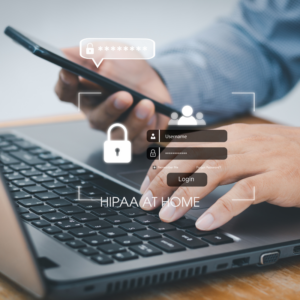 As many employees have traded their sweatpants for office attire and returned to the office post-pandemic, healthcare workers are still going strong in the world of remote work. With the increase in Telehealth services, remote patient monitoring, and chronic care management more and more fully remote healthcare positions are being created than ever before.
As many employees have traded their sweatpants for office attire and returned to the office post-pandemic, healthcare workers are still going strong in the world of remote work. With the increase in Telehealth services, remote patient monitoring, and chronic care management more and more fully remote healthcare positions are being created than ever before.
But here’s the thing: while HIPAA is a top priority in hospitals and clinics, does it stay a priority when you’re working from home? Sure, at the office, we’re surrounded by HIPAA-compliant measures like locked cabinets, monitor privacy screens, and those ever-important shred bins for patient documents. But at home? It’s easy to get comfortable and forget that the same rules apply—even if your audience is just your dog, not a room full of patients and colleagues. But remember, your family and friends are still watching, and they don’t need to be privy to personal health info (PHI).
Patients have the same rights and protections regarding their PHI no matter where you work. Here are some friendly reminders for staying HIPAA-compliant at home. Click each item below for more details:
If you are able to , try to use your employer’s remote network instead of taking home paper documents with PHI. Ask your IT team for secure access. Your digital footprint is much safer than a paper trail.
Keep those docs far from the curious eyes of your family, roommates, or nosy pets. Secure any PHI you bring home from being seen, heard, or sniffed out (yes, even by your dog).
Use company-issued devices and ensure you’re accessing everything via a secure VPN or portal. Multifactor Authentication is your friend, make sure it’s on. Log off when you’re done for the day or stepping away from your desk. Trust us, it’s not worth leaving PHI exposed while you grab a snack. No PHI should be left lying around your home office or visible to your housemates. And definitely don’t leave it in view of your Wi-Fi security system. Never store PHI on personal computers. It’s like bringing your work to a house party, it’s just not safe.
Printing PHI should be a last resort. If you have to, make sure those documents are locked away in a secure cabinet and shredded when no longer needed. Don’t toss them in your kitchen trash, those things don’t get the HIPAA treatment they deserve. Shred them or return them to the proper disposal bins at the office.
Keep those docs far from the curious eyes of your family, roommates, or nosy pets. Secure any PHI you bring home from being seen, heard, or sniffed out (yes, even by your dog).
When you take a break, log off your computer. It sounds like a no-brainer, but sometimes that leftover lunch break or Netflix binge could lead to someone stumbling upon sensitive information.
Be mindful of where your PHI is visible. That cute nanny cam in the corner? It’s not so cute when it’s broadcasting your screen to the world. Shield your sensitive data from prying eyes.
Never text patient information, orders, labs or questions on your personal phone. All sensitive info should be shared through a secure, encrypted network or via a company-issued, password-protected device.
In summary, whether you’re in the office or at home, HIPAA is always watching—just like that one family member who always seems to be lurking when you least expect it. Stay secure, stay compliant, and remember: your patients’ privacy is in your hands.
~ Lalah Landers, BSN, Clinical Liaison at CliniSight LLC
 As many employees have traded their sweatpants for office attire and returned to the office post-pandemic, healthcare workers are still going strong in the world of remote work. With the increase in Telehealth services, remote patient monitoring, and chronic care management more and more fully remote healthcare positions are being created than ever before.
As many employees have traded their sweatpants for office attire and returned to the office post-pandemic, healthcare workers are still going strong in the world of remote work. With the increase in Telehealth services, remote patient monitoring, and chronic care management more and more fully remote healthcare positions are being created than ever before.